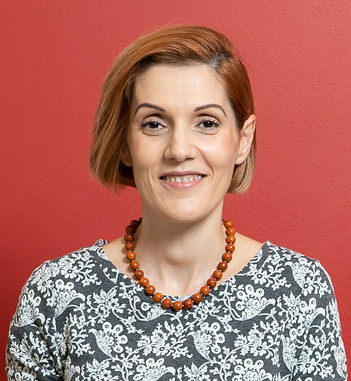AI-enabled Discovery of Macromolecular Structure, Dynamics, and Function
Amarda Shehu
Professor
George Mason University
Biology has undergone many disruptions and revolutions that have opened or redirected entire domains of scientific enquiry. Anfinsen showed us that protein tertiary structure was largely encoded in the amino-acid sequence. John Kendrew’s famous sentences “The way in which the chain of amino acid units in a protein molecule is coiled and folded in space has been worked out for the first time. The protein is myoglobin, the molecule of which contains 2,600 atoms.” instigated decades of computational studies on macromolecular structure, dynamics, and function, starting with the seminal work of Scheraga, Karplus, Levitt, Warshel, and others. Some of the most interesting computational concepts and techniques were debuted in these studies, many of which we would now categorize as “artificial intelligence” (AI). In my own work, I focused heavily, and still do, on the question of knowledge representation, which is central to AI. Then came the data revolution and the revival of neural networks. What was old became new. My laboratory showed data-driven models to be more powerful in many respects, yet not always satisfying. And now comes news DeepMind’s Alphafold2 has solved a 50-year grand challenge in biology. Many of us wonder what these increasingly more frequent AI disruptions mean for our disciplines, our students, and our careers. I will conclude this talk with my admittedly biased perspective and argue that, while we still need to figure out a new collaborative medium, these AI disruptions provide wonderful opportunities to get into complex, messy, integrative scientific enquiries.
Speaker Bio
Dr. Amarda Shehu is a Professor in the Department of Computer Science in the Volgenau School of Engineering with affiliated appointments in the Department of Bioengineering and School of Systems Biology at George Mason University. She is also Co-Director of the Center for Advancing Human-Machine Partnerships (CAHMP), a Transdisciplinary Center for Advanced Study at George Mason University. Shehu obtained her Ph.D. in Computer Science from Rice University in 2008, where she was also an NIH pre-doctoral fellow. Shehu's research focuses on novel algorithms in artificial intelligence and machine learning to bridge between computer and information sciences, engineering, and the life sciences. In particular, her laboratory has made many contributions in bioinformatics and computational biology regarding the relationship between macromolecular sequence, structure, dynamics, and function. Shehu has published over 130 technical papers with postdoctoral, graduate, undergraduate, and high-school students. She is the recipient of an NSF CAREER Award, and her research is regularly supported by various NSF programs, as well as state and private research awards. Shehu is also the recipient of the 2018 Mason University Teaching Excellence Award, the 2014 Mason Emerging Researcher/Scholar/Creator Award, and the 2013 Mason OSCAR Undergraduate Mentor Excellence Award. She currently serves as Program Director at the National Science Foundation in the Information and Intelligent Systems Division of the Computer and Information Science and Engineering Directorate.

